|
|
Conference
participants were greeted by protesters from Greenpeace
(left) and WWF
(below). Some members of Greenpeace feared that economic concerns
might override environmental considerations in the upcoming debates. |
|
WWF
staged a theatrical 'painting of the Earth', wherein actors in protective
suits representing the developed nations of the world sprayed colored
water symbolizing the 12 POPs all over the planet. This was done
to remind participants of the global nature of POPs.
|
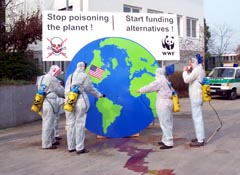 |
|
|
View
of the Plenary Hall from the balcony, as the participants arrive for
the Opening Plenary. |
|
The
invited speakers for the Opening Plenary, from left to right: Klaus
Töpfer, UNEP Executive Director; Bärbel Dieckman, Mayor of Bonn;
and Jürgen Trittin, German Federal Minister for the Environment,
Nature Conservation and Nuclear Safety.
|
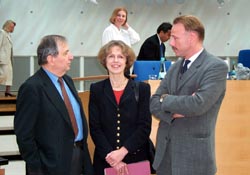 |
|
|
Minister
Trittin highlighted characteristics of new challenges facing environmental
policy and said such policy should be guided by the precautionary
principle. He noted sufficient evidence exists to justify banning
new POPs and urged the chemical industry to rethink its product policy,
noting that the highest POPs emissions come from legally produced
chemical products. |
|
Mayor
Dieckman encouraged transparency and communicativeness to guide
the week's discussions and reiterated Germany's offer to locate
the future Secretariat in Bonn.
|
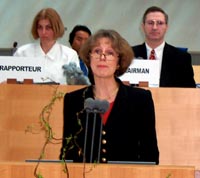 |
|
|
Klaus Töpfer,
UNEP Executive Director, urged agreement on eliminating the 12 POPs,
said POPs are an example of exporting the disadvantages of economic
growth to developing countries, and highlighted the importance of
a precautionary approach. He emphasized the importance of technical
assistance, technology transfer and a financial mechanism to enable
active participation of developing countries.
|
|
|
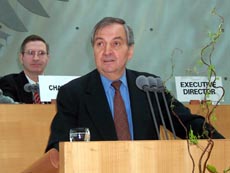 |
|
|
Jim Willis, UNEP Chemicals (below, on the right), overviewed intersessional
work undertaken by the Secretariat and related meeting documents.
With regard to ongoing international activities relevant to the
INC, Willis overviewed the master list of actions on the reduction
and/or elimination of the releases of POPs 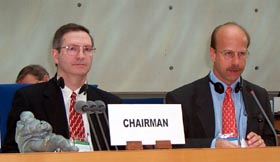 (UNEP/POPS/INC.4/INF/5)
and highlighted UNEP actions on POPs, including training and capacity-building
workshops on, inter alia, managing PCB stocks and addressing
stocks of obsolete pesticides, conducted in collaboration with other
international organizations and donor countries. (UNEP/POPS/INC.4/INF/5)
and highlighted UNEP actions on POPs, including training and capacity-building
workshops on, inter alia, managing PCB stocks and addressing
stocks of obsolete pesticides, conducted in collaboration with other
international organizations and donor countries.
 RealAudio excerpts of Mr. Willis' statement
RealAudio excerpts of Mr. Willis' statement
INC-4 Chair John Buccini (on the left) supported treating the master
list as an ongoing global POPs action plan to expedite the implementation
and ratification process. He reviewed the decisions, milestones
and meetings since 1995 in addressing POPs, and noted that INC-4
needs to address all aspects of the convention
 RealAudio excerpts of Chair Buccini's opening statement: part
one part
two
RealAudio excerpts of Chair Buccini's opening statement: part
one part
two
|
|
CANADA
underlined the importance of technology innovation, pollution prevention,
and the need for a sound, science-based process that exercises precaution
in identifying additional POPs. He announced that CANADA will provide
CND$20 million over the next five years for capacity-building activities
to implement obligations under the future POPs treaty.
|
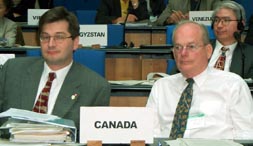 |
|
|
The
INUIT CIRCUMPOLAR CONFERENCE stressed the universal benefits of an
effective convention and called for financial support through a simple,
effective mechanism. |
| View
from the back of the room of Plenary in session
|
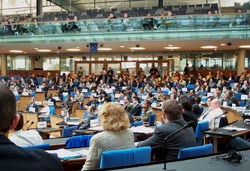 |